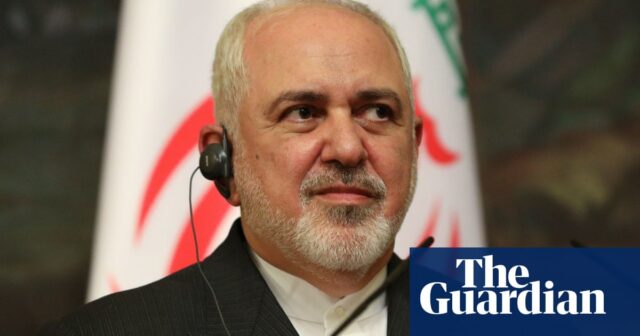A senior Iranian politician has appealed to Donald Trump to begin new negotiations with Tehran over its civil nuclear programme, saying: “I hope that this time around, [Trump 2.0] will be more serious, more focused, more realistic.”
Mohammad Javad Zarif, Iran’s vice-president for strategic affairs, pointed out that the returning US president had not reappointed figures from his first term such as the former secretary of state Mike Pompeo and national security adviser John Bolton, who persuaded him in 2018 to quit the nuclear deal on the basis that withdrawal would lead to the regime’s collapse.
Instead, Zarif said, withdrawal had left Iran closer to obtaining a nuclear bomb, with the components including highly enriched uranium, although he claimed Tehran was not interested in actually making such a weapon.
Zarif, probably the best known Iranian diplomat in the west, was speaking at the World Economic Forum in Davos in his first remarks outside Iran since his country’s election of a reformist government.
He said the continuation of US sanctions was hitting the most vulnerable in Iran hardest and insisted Iran did not want to become a nuclear power. “If we wanted to build a nuclear weapon we could have done so a long time ago,” Zarif said.
He also gave the impression that Iranian society was liberalising, saying women could be seen on the street not wearing the hijab. He said the Iranian leadership had decided not to put pressure on women to obey the law. “It’s a step in the right direction but it is not enough,” he said.
This led to criticism in Iran from those who said Zarif failed to acknowledge that many women still felt harassed and he ignored the price many women had paid for seeking greater freedom during the protests two years ago.
But he gave little sign that Iran was prepared to end its support for groups in the region deemed terrorists by the US, such as Hamas in Gaza. He said: “There’ll be more groups, with or without Iran’s help. Iran has always supported the struggle of people for their human rights, for their right to self determination, and we’ll continue to support that.” But the groups’ resistance stemmed from the injustice suffered by Palestinians, and not Iranian interference, he said.
Zarif said of Hamas’s attack on Israel on 7 October 2023: “We didn’t know … We were set to meet the Americans on JCPOA [the Iran nuclear deal] renewal on 9 October, but the operation destroyed it.”
The nuclear deal was designed to ensure UN inspectors had access to Iran’s nuclear sites and could certify that Iran’s nuclear programme was solely for civilian energy purposes. Trump left the deal in 2018, opting to impose harsh sanctions on Iran, but so far he has been opaque about whether he will now try to strengthen those sanctions or endorse an Israeli government attack on Iran’s nuclear sites.
Two rounds of talks between EU negotiators and Iranian officials in Geneva last month will have given the US intelligence on the kind of preconditions Iran would set in any talks on a new deal, including the sequencing of any lifting of sanctions. Iran wants a – possibly unobtainable guarantee that the US would not again walk out on a deal.
Marco Rubio, the new US secretary of state, acknowledged there were divisions in Tehran about whether a new deal with the US on its nuclear programme was desirable. But some regard Iran’s current weakness, including its damaged air defences, as a good reason to strike. A decision is unavoidable since the key clauses in the original 2015 deal are due to expire in October.
Zarif acknowledged these divisions, adding: “Iran is not a single voice, a uni-voice society. We have many voices and many views, and we cannot shut them down.”
It is not clear if the supreme leader, Ayatollah Ali Khamenei, thinks the lifting of US sanctions, requiring difficult concessions, is necessary. In a speech on Wednesday, Khamenei said it was realistic for Iran to achieve 8% annual growth.
In a potential sign the hardliners may still dominate in Iranian security policy, the head of the UN nuclear weapons inspectorate, Rafael Grossi, said Iran was pressing the gas pedal on uranium enrichment, He said: “Before it was [producing] more or less 7kg [of uranium enriched to up to 60%] per month, now it’s above 30 or more than that. So I think this is a clear indication of an acceleration.” He said Iran had about 200kg of uranium enriched to up to 60%.
Gulf states have become increasingly vocal in opposing an Israeli attack on Iran. The Saudi foreign minister, Prince Faisal bin Farhan Al Saud, in Davos urged Tehran to engage with the US on its nuclear programme. “Obviously a war between Iran and Israel, any war in our region, is something we should try to avoid as much as possible,” he added.
Qatar’s influential prime minister, Mohammed bin Abdulrahman bin Jassim Al Thani, said: “I do not want to see an arms race in the region,” adding he hoped the Gulf states would come together to call for a peaceful path. “I hope we defuse this completely now,” he said.






